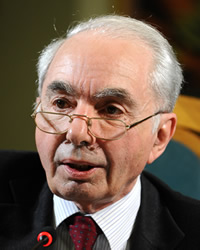
December 3, 2015
“I don’t know the future, but I know that Europe has a future.”
So began Honorable Giuliano Amato, former Italian Prime Minister, Minister of Finance, and sitting judge on the Italian Constitutional Court, in his talk titled “The Future of the EU” on September 29. Amato spoke to a room full of undergraduate and graduate students on national and continental identity in the age of global politics and mass migration as a guest of the European Union Studies Program at the MacMillan Center. Covering the almost 60-year-long history of European integration, Hon. Amato touched upon the most pressing issues and challenges that the EU faces today; from the uncertain formation of a European common identity, to the struggle between supranational governance and national sovereignties.
As plain as his opening comment appears on first glance, “Europe,” as Amato describes it, evades certainty of identity even at the present moment, to say nothing of the next decade or century. He emphasized first that the political unification of the EU obscured a history of conflict between members thereof, and how the struggle for balance between supranational and national governments was endemic in its postwar formation. Today, as the horizons of human interest become increasingly global, and global affairs are experienced as almost-local events, European politicians must find a way to represent their constituents adequately in national and international politics, while recognizing and facilitating the emergence of multiculturalism.
Amato’s discussion centered in part on a specific, topical issue – the current migration crisis – in order to articulate the complications that accompany simultaneous and competing interests within the EU’s configuration. “It is so difficult to cope with our diversities that we must see our similarities” amid the European communities alone, explained Amato, but this preoccupation with shared identity among European citizens only equivocates valid attempts at universal policies for non-European refugees. Beyond the erratic practice of “making promises today and closing borders the following day,” regulations currently in place to handle citizenship and integration reveal themselves insufficient in the face of crises novel in nature and scale. Here Amato emphasized the problem of responsibility for refugees on a nation-by-nation basis, when some nations, such as Italy, may act within this migration pattern merely as a gateway for the rest of Europe, and not as the intended destination.
Despite the problems that European nations face now in their pursuit of democracy on both international and national stages, Amato concluded with confidence that Europeans will find or make a way to honor their multiple political and cultural identities through political discourse. When the EU was formed, “our toolbox was empty,” and yet Europe maintained its cultural and political continuity: “It survived.” Amato’s experiences indicate that European solidarity can be fostered step-by-step as mutual trust is established over time. Integration is ideal, but can only be achieved gradually. The implication, of course, is that policies must be adjusted before they can be disregarded, and that voting rights and practices must continually conform to the changing shape of various constituents. In essence, Europe needs politicians on every level who can exercise courage with patience, and remain courageous in their ambitions even as policy shifts occur slowly.
